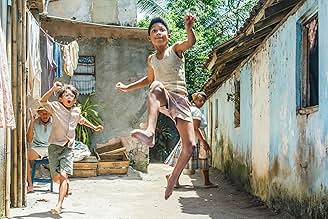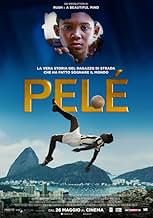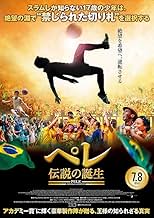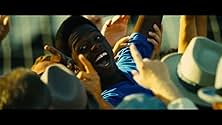NOTE IMDb
7,1/10
22 k
MA NOTE
Ajouter une intrigue dans votre languePele's meteoric rise from the slums of Sao Paulo to leading Brazil to its first World Cup victory at the age of 17 is chronicled in this biographical drama.Pele's meteoric rise from the slums of Sao Paulo to leading Brazil to its first World Cup victory at the age of 17 is chronicled in this biographical drama.Pele's meteoric rise from the slums of Sao Paulo to leading Brazil to its first World Cup victory at the age of 17 is chronicled in this biographical drama.
- Réalisation
- Scénario
- Casting principal
Phil Miler
- Narrator
- (voix)
Eric Bell Jr.
- Zoca
- (voix)
Avis à la une
Pele is one of the most spiritual sports movies I've ever seen and is more heart than anything else.
It's more about the pride of Brazil and Edson Arantes do Nascimento being a beautiful symbol of it.
Pele is a poor kid form a poor part of Brazil who was good enough to use football to start building a better life by being a part of the 1958 Olympic team. More to the story, is that from the place he is from , his father taught him the ginga, for the purpose of the movie, the ginga is a celebration of Brazil's African heritage focus through football, a system that most of Brazil feels lost them the last two Olympic games, but Pele realized they were not doing it right and shows them the path that leads to the gold and Brazilian pride.
The acting itself did not bring on this spirit, but I did like the acting. From the trailer, I was not sure if Vincent D'Onofrio could pull off the role as the team's coach, but indeed he does a find job. It's one of the few sports movies in which the coach's inspiration is a very small part of the movie, but D'Onofrio does well with the little he's got.
The spirit comes more in the film making itself , as they use small special effects like slow motion to make Pele look divine every time he gets the ball, inter cut with scenes of people watching in total ah of what he can do. At first it seems cheesy when they first start doing it, but after a while it gets into a rhythm that gets you into it, and you can't help but to let it touch your soul.
I don't think it's better or worse than any other sports movie. What makes it unique is that they're are very few of these about Soccer (and so many about American Football), but it does the trick of inspiring you and having you cheer for the underdog, though I feel I did not really learn much about Pele in the process.
It's more about the pride of Brazil and Edson Arantes do Nascimento being a beautiful symbol of it.
Pele is a poor kid form a poor part of Brazil who was good enough to use football to start building a better life by being a part of the 1958 Olympic team. More to the story, is that from the place he is from , his father taught him the ginga, for the purpose of the movie, the ginga is a celebration of Brazil's African heritage focus through football, a system that most of Brazil feels lost them the last two Olympic games, but Pele realized they were not doing it right and shows them the path that leads to the gold and Brazilian pride.
The acting itself did not bring on this spirit, but I did like the acting. From the trailer, I was not sure if Vincent D'Onofrio could pull off the role as the team's coach, but indeed he does a find job. It's one of the few sports movies in which the coach's inspiration is a very small part of the movie, but D'Onofrio does well with the little he's got.
The spirit comes more in the film making itself , as they use small special effects like slow motion to make Pele look divine every time he gets the ball, inter cut with scenes of people watching in total ah of what he can do. At first it seems cheesy when they first start doing it, but after a while it gets into a rhythm that gets you into it, and you can't help but to let it touch your soul.
I don't think it's better or worse than any other sports movie. What makes it unique is that they're are very few of these about Soccer (and so many about American Football), but it does the trick of inspiring you and having you cheer for the underdog, though I feel I did not really learn much about Pele in the process.
I was invited to the world premier of this film at the TriBeCa Film Festival, in New York. I say invited, as if my life is some sort of glamorous affair. In reality, a mate at work couldn't make it, and he knew I'd have no actual plans, so I eagerly obliged.
Just before the movie started, the 350 or so people in the audience got what they wanted, as the man himself stood up and raised his hand to the instagram happy crowd. Just knowing Pele was in the audience gave the room a little extra energy.
Perhaps a little naive, I knew a little about Pele's playing career but little of the man and, the journey to what he became. The film follows his early years with friends at home, up until he becomes 17 and plays for Brazil in the 1958 World Cup in Sweden. There's enough humour, big laughs, drama, and passion in the film that will translate to fans familiar with the legend and those who may have only heard of him.
The real treat, were the applause, and cheering from the audience when the on-screen Pele scored. His hand went up in recognition and the cheers got louder. I was pleased that despite the film keeping my attention he may have nodded off, he's knocking on a bit.
I waited outside afterward and managed to get a signed Santos shirt from him, which kinda gave me goose pimples, and rammed home the magnitude of who this man was, and what he had done for the game. My dad would have been proud. Sadly the shirt is the guys from work, so I'm currently deciding whether to buy a replica shirt and say I didn't get it, or beginning to practice the man's signature! That's okay, isn't it...
I did snap a selfie. Insta - Jamesbydesign
Just before the movie started, the 350 or so people in the audience got what they wanted, as the man himself stood up and raised his hand to the instagram happy crowd. Just knowing Pele was in the audience gave the room a little extra energy.
Perhaps a little naive, I knew a little about Pele's playing career but little of the man and, the journey to what he became. The film follows his early years with friends at home, up until he becomes 17 and plays for Brazil in the 1958 World Cup in Sweden. There's enough humour, big laughs, drama, and passion in the film that will translate to fans familiar with the legend and those who may have only heard of him.
The real treat, were the applause, and cheering from the audience when the on-screen Pele scored. His hand went up in recognition and the cheers got louder. I was pleased that despite the film keeping my attention he may have nodded off, he's knocking on a bit.
I waited outside afterward and managed to get a signed Santos shirt from him, which kinda gave me goose pimples, and rammed home the magnitude of who this man was, and what he had done for the game. My dad would have been proud. Sadly the shirt is the guys from work, so I'm currently deciding whether to buy a replica shirt and say I didn't get it, or beginning to practice the man's signature! That's okay, isn't it...
I did snap a selfie. Insta - Jamesbydesign
Brazilian teams play a style of soccer all their own. (Yeah, I called it soccer. Gimmie a break. I'm an American.) They call that style "ginga". It's a very fluid kind of play that emphasizes creative ball control. Some call this style of play "flamboyant". Others dismiss it as "trick plays". Brazilians simply think of it as
their heritage. The Urban Dictionary's definition of ginga states, in part, "Ginga is creativity... the opposite of mechanical soccer. It is having fun with the ball. It is grace. It is being fluid and coordinated. IT IS SOUL. IT IS DANCE." A June 15, 2014 "New York Times" article explains the development of ginga this way: "
an imaginative style of play that made competition and gratifying playfulness inseparable, with blacks and people of mixed race rising from exclusion and becoming its main protagonists." Ginga is a unique mixing of the skills of samba dancers with Brazilian martial arts fighters, all applied to the game of soccer, turning it into, as the Brazilians call it, "the beautiful game", while also celebrating Brazil's different races and cultures. The focus on ginga in the biopic "Pelé: Birth of a Legend" (PG, 1:47) educates its audience, celebrates that style of soccer and captivates Movie Fans with the true rags-to-riches story of the greatest soccer player ever, a man known all around the world simply as
Pelé.
As the film opens, the nearly 10-year-old Pelé (born Edson Arantes do Nascimento, and called "Dico" by his family and friends) is watching a television broadcast as his native Brazil loses the 1950 World Cup to Uruguay. Brazil's loss was a huge upset, a phrase which also describes the emotions of Brazil's soccer fans (which was basically everybody). The entire country was shocked, humiliated and demoralized. Dico (Leonardo Lima Carvalho) promises his father, a former soccer player known as Dondinho (played by Brazilian musician/actor Seu Jorge), that he, Dico, will one day bring Brazil a World Cup Championship.
Dico's family is so poor that Dico doesn't even own a soccer ball – or even a pair of shoes, but the kid manages to develop his natural talent anyway. Under his father's tutelage, he learns ball-handling by juggling and kicking grapefruits and he plays on a local team with his friends. Their team is literally called "The Shoeless Ones" and is mercilessly mocked by the town's rich kids, who single out Dico for a special measure of abuse and start calling him "Pelé". It's a made-up name which is meant to be an insult, and Dico hates the name, but as he works through his anger by helping his team play better than expected on the soccer field, the name sticks, and "Pelé" becomes synonymous with Dico and his amazing talent.
Continuing to hone his skills on his own time and play brilliantly on the field in spite of having to endure prejudice and personal tragedy, Pelé (played as a teenager by Kevin de Paula) is recruited and mentored by former player Waldemar De Brito (Milton Gonçalves). Pelé's talent gets him a spot on a professional soccer club, Santos FC, and then on Brazil's national team, all before he reached the age of 17. On the national team, Pelé's coach is Vicente Feola (Vincent D'Onofrio), the latest in a series of coaches who tries to beat Pelé's individuality out of him and force him to play a more traditional and "sophisticated" European style. Many Brazilians blamed the ginga style of play for the 1950 World Cup loss, but ginga is Pelé's strength. Pelé finds himself struggling with his coach's instruction, and an old adversary turned teammate, plus a significant knee injury, all while the national team prepares for the 1958 World Cup tournament and a possible championship matchup against the heavily-favored team representing the host country of Sweden, coached by the arrogant and condescending George Raynor (Colm Meaney).
"Pelé: Birth of a Legend" represents formulaic and unrefined filmmaking, but still manages to inspire on multiple levels. Co-written and co-directed by brothers Jeff and Michael Zimbalist (both working on their first feature film), the movie follows the tried-and-true pattern of most sports movies, but suffers from some minor issues of technique. The script sometimes stops short of completing its thoughts and the film is a bit over-edited, making the viewer feel like something is missing in a few of the scenes. Some characters are underdeveloped and some of the acting is shaky, but the main characters (especially D'Onofrio, Jorge and de Paula) all give strong performances. The film spends too much time on Pelé's childhood and not enough time on his rise through the ranks of Brazilian soccer, but does convey why Pelé was so good and wisely culminates with the '58 World Cup, at which point it's clear that all the pieces are finally in place for Pelé's eventual worldwide fame and unparalleled success. In spite of the film's lack of originality and other relatively minor problems, the Zimbalist brothers and their cast and crew give us plenty to shout about during the film's third act and leaves us with important lessons about determination, resilience and playing to our strengths, as well as the importance and strength of diversity. As much as I enjoyed "Pelé: Birth of a Legend" (especially its emotional ending), after fairly weighing all of its strengths and weaknesses, the most I can give it is a mild recommendation: "B"
As the film opens, the nearly 10-year-old Pelé (born Edson Arantes do Nascimento, and called "Dico" by his family and friends) is watching a television broadcast as his native Brazil loses the 1950 World Cup to Uruguay. Brazil's loss was a huge upset, a phrase which also describes the emotions of Brazil's soccer fans (which was basically everybody). The entire country was shocked, humiliated and demoralized. Dico (Leonardo Lima Carvalho) promises his father, a former soccer player known as Dondinho (played by Brazilian musician/actor Seu Jorge), that he, Dico, will one day bring Brazil a World Cup Championship.
Dico's family is so poor that Dico doesn't even own a soccer ball – or even a pair of shoes, but the kid manages to develop his natural talent anyway. Under his father's tutelage, he learns ball-handling by juggling and kicking grapefruits and he plays on a local team with his friends. Their team is literally called "The Shoeless Ones" and is mercilessly mocked by the town's rich kids, who single out Dico for a special measure of abuse and start calling him "Pelé". It's a made-up name which is meant to be an insult, and Dico hates the name, but as he works through his anger by helping his team play better than expected on the soccer field, the name sticks, and "Pelé" becomes synonymous with Dico and his amazing talent.
Continuing to hone his skills on his own time and play brilliantly on the field in spite of having to endure prejudice and personal tragedy, Pelé (played as a teenager by Kevin de Paula) is recruited and mentored by former player Waldemar De Brito (Milton Gonçalves). Pelé's talent gets him a spot on a professional soccer club, Santos FC, and then on Brazil's national team, all before he reached the age of 17. On the national team, Pelé's coach is Vicente Feola (Vincent D'Onofrio), the latest in a series of coaches who tries to beat Pelé's individuality out of him and force him to play a more traditional and "sophisticated" European style. Many Brazilians blamed the ginga style of play for the 1950 World Cup loss, but ginga is Pelé's strength. Pelé finds himself struggling with his coach's instruction, and an old adversary turned teammate, plus a significant knee injury, all while the national team prepares for the 1958 World Cup tournament and a possible championship matchup against the heavily-favored team representing the host country of Sweden, coached by the arrogant and condescending George Raynor (Colm Meaney).
"Pelé: Birth of a Legend" represents formulaic and unrefined filmmaking, but still manages to inspire on multiple levels. Co-written and co-directed by brothers Jeff and Michael Zimbalist (both working on their first feature film), the movie follows the tried-and-true pattern of most sports movies, but suffers from some minor issues of technique. The script sometimes stops short of completing its thoughts and the film is a bit over-edited, making the viewer feel like something is missing in a few of the scenes. Some characters are underdeveloped and some of the acting is shaky, but the main characters (especially D'Onofrio, Jorge and de Paula) all give strong performances. The film spends too much time on Pelé's childhood and not enough time on his rise through the ranks of Brazilian soccer, but does convey why Pelé was so good and wisely culminates with the '58 World Cup, at which point it's clear that all the pieces are finally in place for Pelé's eventual worldwide fame and unparalleled success. In spite of the film's lack of originality and other relatively minor problems, the Zimbalist brothers and their cast and crew give us plenty to shout about during the film's third act and leaves us with important lessons about determination, resilience and playing to our strengths, as well as the importance and strength of diversity. As much as I enjoyed "Pelé: Birth of a Legend" (especially its emotional ending), after fairly weighing all of its strengths and weaknesses, the most I can give it is a mild recommendation: "B"
Pelé: Birth of a Legend is an extraordinary movie, the tale of how Pelé became famous and won with Brazil their first world cup in the 1958 world cup in Sweden. This is probably the most successful movie that focuses on soccer. A true story of a boy with nothing who became the world's greatest soccer player. No famous actors in this film except for Vincent D'Onofrio. But the movie doesn't need famous actors to attract the attention of the viewers, it's beautiful story is what attracted me in the first place. Along with the music composed by A. R. Rahman That follows the emotion and scenes throughout the film. Pelé's legend is worth to be told and has a deep meaning to Brazil's history of soccer and hope of becoming the best. The movie is also a story of restoring honor and hope to a full nation. Only it is sad that today Brazil's soccer team can't be as great as it was back then. So this film brings a lot of nostalgia towards the past and a better hope for the future. I am hoping to see other movies about soccer like this one in the future, maybe a movie about Neymar or Messi.
Like the excellent Kevin Costner film: "McFarland USA" this movie sensitively shows how sport can significantly alter a people's identity (in this case the entire nation of Brazil was uplifted from a sense of inferiority within the world community, to a pride in their own uniqueness). The acting is good. The sports action scenes are remarkable (how did they get an actor with such great soccer skills?) and the music is by the great A.R. Raman. A lot of care was put into the making of this film, but a lot was lost, I feel, by having the actors speak mostly in English. And it wasn't dubbed English, it was the Brazilian actors trotting out their heavily accented English. That had the effect of taking away much of the authenticity the film had worked so hard to achieve. (That the real-life Pelé has a cameo appearance - and thus takes the viewer out of the scene's intended verisimilitude - is, perhaps, excusable - I can cut it that slack). One more grumble: the movie trailers announced: "With Rodrigo Santoro". I will see anything with him in it - he is a terrific actor. But he appears for LITERALLY FIVE SECONDS! Really! That is unacceptable marketing...'bait and switch', actually. But see the movie anyway. (BTW, I met Pelé in 1984. We talked for about ten minutes, and at one point, after we had been briefly interrupted, he put his arm around me and said: "So, my Brazilian-American friend, where were we?" He had a golden air about him, and yet was completely down-to-earth even though we talked about cosmic reality. To listen to my five minute audio recording about meeting Pelé, search for "Pelé And His Brazilian- American Friend".
Le saviez-vous
- AnecdotesThe Old Guy in suit who's tea was dropped by the Brazilian team at the hotel before the Final of 1958 World cup was actually the real Pele as himself.
- GaffesIn the film, Pelè's mother is a servant in Josè Altafini "Mazzola's" home. In real life, both Pelè and Altafini were from modest families. They also lived in different towns.
- Crédits fousThe end credits include the disclaimer that "The persons and events in this motion picture are fictitious. Any similarity to actual persons or events is unintentional." Which is of course ridiculous considering this is a biopic of Pelé loaded with real events (like the 1958 world cup).
- ConnexionsFeatures 1958 FIFA World Cup (1958)
Meilleurs choix
Connectez-vous pour évaluer et suivre la liste de favoris afin de recevoir des recommandations personnalisées
- How long is Pele: Birth of a Legend?Alimenté par Alexa
Détails
- Date de sortie
- Pays d’origine
- Site officiel
- Langues
- Aussi connu sous le nom de
- Pele: Birth of a Legend
- Lieux de tournage
- Sociétés de production
- Voir plus de crédits d'entreprise sur IMDbPro
Box-office
- Montant brut aux États-Unis et au Canada
- 57 046 $US
- Week-end de sortie aux États-Unis et au Canada
- 7 226 $US
- 15 mai 2016
- Montant brut mondial
- 7 846 608 $US
- Durée1 heure 47 minutes
- Couleur
- Rapport de forme
- 2.35 : 1
Contribuer à cette page
Suggérer une modification ou ajouter du contenu manquant

Lacune principale
What is the French language plot outline for Pelé: Naissance d'une Légende (2016)?
Répondre

































